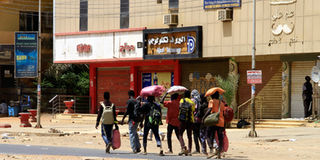Sudan battles rage as more civilians risk dangerous escape

People carrying their belongings walk along a street in Khartoum on April 16, 2023, as fighting between the forces of two rival generals continues. Photo | AFP
What you need to know:
- Those unable to escape grapple with shortages of food and other essentials, surviving only thanks to Sudanese charity networks among friends and neighbours, as talks to secure the safe delivery of aid yield no noticeable progress.
Fighting raged in the Sudanese capital and a city to the south Wednesday, residents said, pushing more people to undertake dangerous journeys to safety across the country's borders.
Those unable to escape grapple with shortages of food and other essentials, surviving only thanks to Sudanese charity networks among friends and neighbours, as talks to secure the safe delivery of aid yield no noticeable progress.
"We were woken by explosions and heavy artillery fire," one resident of Khartoum's sister city Omdurman told AFP as smoke drifted over the capital.
Other witnesses reported new air raids over the capital and counter-fire from anti-aircraft guns.
During the night, two huge blasts were heard across greater Khartoum, residents of multiple districts said, in the fourth week of battles between army chief Abdel Fattah al-Burhan and his former deputy Mohamed Hamdan Daglo, who commands the paramilitary Rapid Support Forces (RSF).
More than 750 people have been killed in the fighting which has wounded more than 5,000, according to the Armed Conflict Location and Event Data Project.
In El Obeid, the North Kordofan state capital about 350 kilometres (190 miles) southwest of Khartoum, residents on Wednesday also reported fighting and explosions.
More than 700,000 people are now internally displaced by battles that began on April 15, and another 150,000 have fled the country, UN agencies said this week.
An average of 1,000 are registered every day by the International Organization for Migration at the dusty, sun-scorched Ethiopian border town of Metema.
Checkpoints
Every person interviewed by AFP in Metema spoke of the terror leading up to their departure -- days spent holed up at home in a city gripped by gunfire and bombings, followed by a 550-kilometre journey haunted by fear of armed robbery en route.
Ethiopian waiter Mohamed Ali, who moved to Khartoum seven years ago, said he left everything behind to flee.
"At each checkpoint, (armed men) searched us... and took whatever they found, including our money and any belongings we had," he told AFP.
The United States and Saudi Arabia said the army and RSF would hold "pre-negotiation talks" in the Saudi city of Jeddah from last Saturday, but there has been no announcement of progress there.
Martin Griffiths, the top UN aid official, has left Jeddah after he "proposed a declaration of commitments for the two parties to guarantee the safe passage of humanitarian relief," a UN spokesman in New York said on Tuesday.
Several aid workers have been killed in the fighting and humanitarian facilities ransacked.
Cindy McCain, World Food Programme executive director, said nearly 25 percent of the agency's food has been looted.
Pillaging and looting
Outside of Khartoum, the long-troubled Darfur region bordering Chad has seen some of the worst unrest.
"More than 250,000 people have been displaced in Darfur, where armed groups kill and attack civilians, loot premises and trucks of aid workers," the Islamic Relief aid group reported.
In Zalingei, Central Darfur's capital, the local market had been pillaged, Islamic Relief said.
Two decades ago a rebellion began in Darfur against perceived domination of Sudan's power and wealth by the country's Arab elites. In response, the government of Omar al-Bashir unleashed the Janjaweed militia, leading to war crimes charges against Bashir and others.
The RSF are descended from the Janjaweed.
Despite the dangers and challenges, the UN continues "to ramp up our efforts to respond to the crisis," Farhan Haq, deputy spokesman for UN Secretary-General Antonio Guterres, told reporters on Wednesday.
Even before this war triggered what the UN calls a "catastrophic" humanitarian situation, one-third of Sudan's population needed aid.
"It's clear that because of the needs on the ground, we're going to proceed with humanitarian operations whether there's a ceasefire or not," Haq said earlier.
"But in order to make sure that safe passage is guaranteed, we want the parties to adhere to a declaration of commitments."
On Wednesday an Emirati military plane arrived in Port Sudan with aid, after two Saudi Arabian aircraft loaded with humanitarian material landed there on Tuesday, AFP journalists said.





